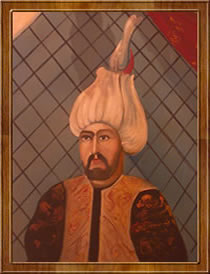Mehmed Sokollu
|
|
Mehmed Pasha Sokollu (Serbo-Croatian Mehmed Paša Sokolović) (1505, Sokol, Bosnia - 1579 Istanbul, Turkey) was the Grand Vizier (1565 - 1579) of Suleyman the Magnificent and Selim II.
Sokollu was recruited into the Ottoman military through the devsirme (child-tribute). In 1546 he was promoted to High Admiral of the fleet. Years later he became the governor-general of Rumelia. After Suleyman died, his sons, Selim and Bayezid, fought for the throne. Sokollu led Selim's army and won. He then married Sultan Selim's daughter in 1562. Selim II was the first Sultan entirely devoid of military virtues and willing to abandon all power to his ministers, provided he were left free to pursue his orgies and debauches. Therefore, he became known as the sot. Fortunately for the empire, Mehmed Sokollu, was at the head of affairs, and two years after Selim's accession succeeded in concluding at Constantinople an honourable treaty with the Emperor Maximilian II, whereby the emperor agreed to pay an annual "present" of 30,000 ducats (February 17, 1568).
Against Russia he was less fortunate, and the first encounter between the Ottoman Empire and her future northern rival gave presage of disaster to come. A plan had been elaborated at Constantinople for uniting the Volga and Don by a canal, and in the summer of 1569 a large force of Janissaries and cavalry were sent to lay siege to Astrakhan and begin the canal works, while an Ottoman fleet besieged Azov. But a sortie of the garrison of Astrakhan drove back the besiegers; 15,000 Russians, under Knes Serebianov, attacked and scattered the workmen and the Tatar force sent for their protection; and, finally, the Ottoman fleet was destroyed by a storm. Early in 1570 the ambassadors of Ivan the Terrible concluded at Constantinople a treaty which restored friendly relations between the Sultan and the tsar.
Expeditions in the Hejaz and Yemen were more successful, but the conquest of Cyprus in 1571, which provided Selim with his favourite vintage, led to the calamitous naval defeat at Lepanto in the same year, the moral importance of which has often been under-estimated, and which at least freed the Mediterranean from the corsairs by whom it was infested.
The empire's shattered fleets were soon restored, and Sokollu was preparing for a fresh attack on Venice, when the Sultan's death cut short his plans. After the Sultan's death Sokollu was left with almost no power and was soon assassinated in 1579.

